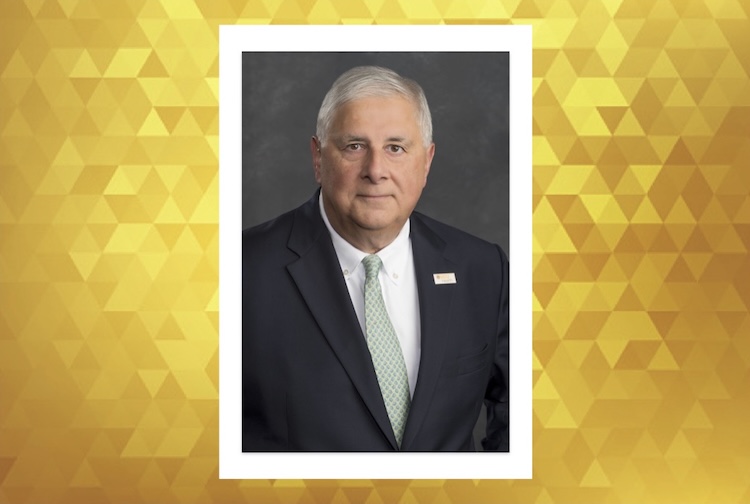
VCU Medical Center team member becomes first Black woman president of Medical Society of Virginia
At the helm of the professional organization, Alice Coombs, M.D., will draw on more than 30 years of experience in advocacy and health care policy reform.
October 31, 2023 Alice Coombs, M.D., chair of the VCU School of Medicine Department of Anesthesiology and VCU Health team member, was sworn in as president of the Medical Society of Virginia in October 2023. (VCU Enterprise Marketing and Communications)
Alice Coombs, M.D., chair of the VCU School of Medicine Department of Anesthesiology and VCU Health team member, was sworn in as president of the Medical Society of Virginia in October 2023. (VCU Enterprise Marketing and Communications)
By Laura Ingles
“Wherever you practice medicine, you are the voice of the patients you take care of.”
Alice Coombs, M.D., has built her career around this belief. That’s why she not only takes care of patients in the hospital at VCU Medical Center, but she also advocates for them at the local, state and national levels.
Coombs, who’s been at Virginia Commonwealth University School of Medicine since 2017 and chair of the Department of Anesthesiology since 2021, was recently elected president of the Medical Society of Virginia (MSV). She is the first Black woman to serve as president — and only the fourth female president — of the MSV, which was founded in 1821. And according to the American Medical Association, Coombs is the first person ever to serve as president of two state medical societies, having served as president of the Massachusetts Medical Society in 2010.
Coombs says she got involved in medical societies early in her career because she wanted to do more than provide health care — she wanted to improve it. For her, that means examining and challenging public policies.
“Part of understanding what patients have to go through to get proper access to care, is understanding the landscape of health care and health disparities, and that takes into account the public policy perspective," Coombs said. “Working in the medical societies or any professional organization allows you to not be on the sidelines with a simple vote. It allows you to have a scalable impact.”
An advocate for patients and physicians
Discussing health disparities wasn’t part of the curriculum when she was a medical student at UCLA, Coombs says. She and her peers didn’t discuss social determinants of health, microaggressions or implicit biases in the clinical setting. But she had observed those realities as a little girl growing up in a mostly Black neighborhood in Compton, California, in the 1960s, and in medical school she saw the stark contrast between hospitals in different parts of the city. She recalled rotating through Martin Luther King, Jr. Community Hospital, which serves a primarily Black and Spanish-speaking population.
“That’s where I learned about disparities more than any other place, and it was through pure observation,” she said. “It wasn’t like my instructors ever brought up health care disparities, health care equality, equity or anything. It wasn’t really coined that, and you have to understand that the literature was very weak back then.”
Against the guidance of her medical school adviser, Coombs became the first UCLA graduate to match into the internal medicine residency program at Massachusetts General Hospital, Harvard University’s academic medical center. She then completed a second residency in anesthesiology and fellowships in both critical care medicine and cardiothoracic anesthesia.
Over the course of her decades-long career, she helped implement a Massachusetts law around addressing adverse events in patient care, led the American Medical Association’s Commission to Eliminate Health Care Disparities, chaired the commission’s diversity committee and served on the Medicare Payment Advisory Commission during the Obama administration. When she is one of the only physicians in a room of decision-makers, Coombs believes it is her responsibility to speak up for both her colleagues and her patients, calling herself a “touch-the-patient-doctor.”
In her role as MSV president, one of her top priorities will be payment reform for doctors, which she said will be a “major issue for the rest of our lives.”
“When it comes to advocating at the state and federal legislatures, the Medical Society of Virginia has done a phenomenal job,” Coombs said. “I’m very proud to be part of a society that takes seriously its charge of really advocating for physicians and patients and advocating for the sanctity and protection of the physician-patient relationship.”
Another item on Coomb’s agenda during her presidency is supporting the mental health and wellness of physicians and medical professionals.
Art Saavedra, M.D., dean of the VCU School of Medicine, attended Coombs’ swearing-in ceremony and commended her career-long dedication to improving both the health of per patients and the landscape of health care.
“Dr. Coombs exemplifies the School of Medicine’s values of diversity, equity and inclusion, collaboration and community engagement,” Saavedra said. “We are extraordinarily lucky to work alongside and learn from Dr. Coombs as she continues to blaze trails in patient care and advocacy.”



